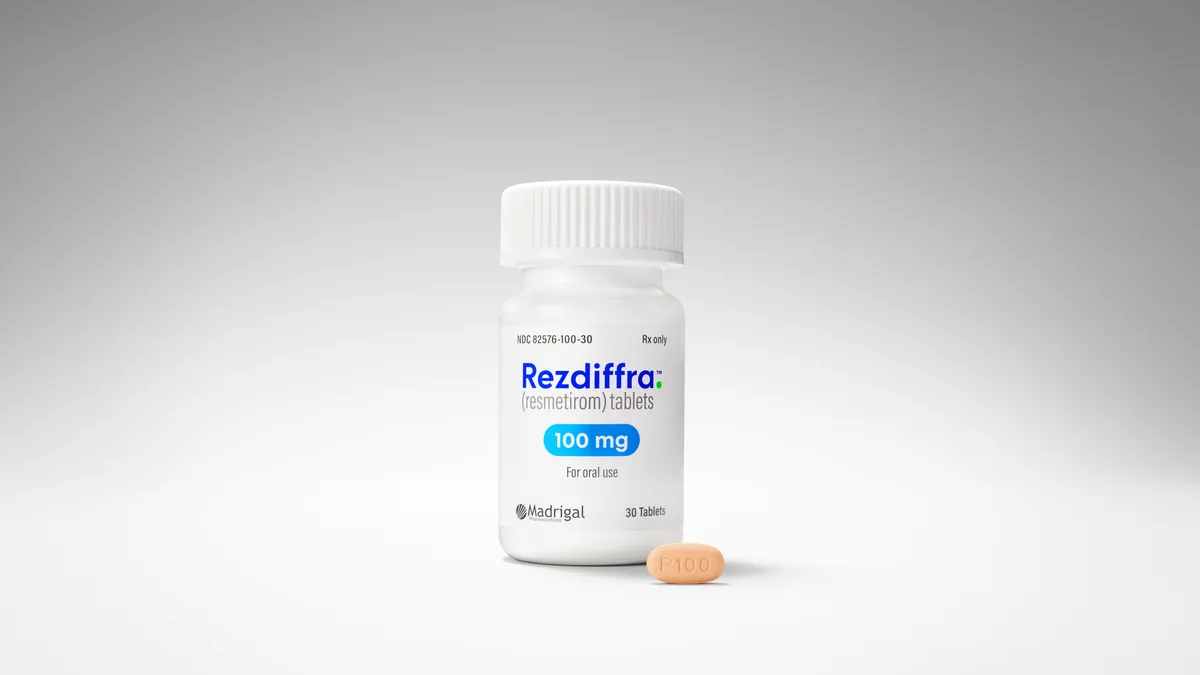After years of pharma’s clinical struggles in a tough indication with high unmet needs, Madrigal Pharmaceuticals finally crossed the regulatory finish line with the first FDA approval of a drug for the liver disease metabolic dysfunction-associated steatohepatitis (MASH) this month.
The therapy, Rezdiffra, is the first medication that directly affects liver scarring. MASH, formerly known as NASH (noncirrhotic non-alcoholic steatohepatitis), is a progressive disease often associated with type 2 diabetes and obesity that stems from inflammation and can trigger liver scarring and dysfunction. It’s the most severe form of nonalcoholic fatty liver disease, which impacts roughly 25% of U.S. adults.
MASH therapies have been a hot target of the pharma industry for years without much success.
“Until now, there were no approved treatments for NASH, and today’s decision by the FDA provides hope to millions of Americans dealing with this dangerous and progressive disease,” Lorraine Stiehl, CEO of American Liver Foundation, said in a press release about Rezdiffra’s approval.
Numerous candidates have failed in recent years: Intercept Pharmaceuticals received a second FDA denial for its MASH drug in June, which led the company to abandon the space entirely.
Gilead Sciences and Genfit also terminated MASH trials in 2019 and 2020 after phase 3 trials missed their primary endpoints.
But MASH’s prevalence has kept the disease a high priority for the industry — and has now pushed Madrigal into future blockbuster territory.
Interest in MASH also led to more deal activity over the last decade, according to a recent white paper from IQVIA. From 2015 to 2022, MASH-focused deal volume was in the double digits, reaching a high of 27 deals in 2020. Biotech companies also account for 64% of the clinical-stage MASH pipeline, according to IQVIA, making them top targets for larger pharma companies looking to get into the space.
Just days after announcing the approval, Madrigal also revealed plans for a public offering, with gross proceeds figured to reach about $600 million. The offering is expected to close around March 21, and will enter a biotech market that’s been heating up since the start of the year.
Madrigal’s moves are being overseen by the company’s new CEO, Bill Sibold, who was appointed to the top job in September. The offering, which was increased by $100 million after its initial announcement, will fund the commercialization of Rezdiffra.
Rezdiffra’s price reflects the value of the drug as the first and only approved therapy for MASH, the company said in its approval presentation. The $47,400 price tag is within the cost-effectiveness range by drug price watchdog the Institute for Clinical and Economic Review of $39,600 to $50,100.
Madrigal said patients will pay a $10 co-pay for the medication with commercial insurance, while those without insurance may be able to receive the medication for free. The company also hired more than 150 new staffers focused on the drug’s commercialization, The Wall Street Journal reported.
A competitive landscape
While Madrigal is the first company to snag an approval, pharma has more drugs in the pipeline, including potential competition from the fast-growing class of diabetes and weight loss drugs. Because GLP-1 drugs, such as Novo Nordisk’s Ozempic and Eli Lilly’s Mounjaro are so effective, the companies are testing them to treat MASH, which can be improved or even reversed by weight loss.
The drugs are in such high demand the anti-obesity market growth estimates have soared to as high as $100 billion or $200 billion by 2030. And Novo Nordisk still has Ozempic on shortage due to ongoing demand.
Beyond GLP-1s, other potential competition includes late-stage candidates from Inventiva Pharma, Galmed Pharmaceuticals and 89bio.













